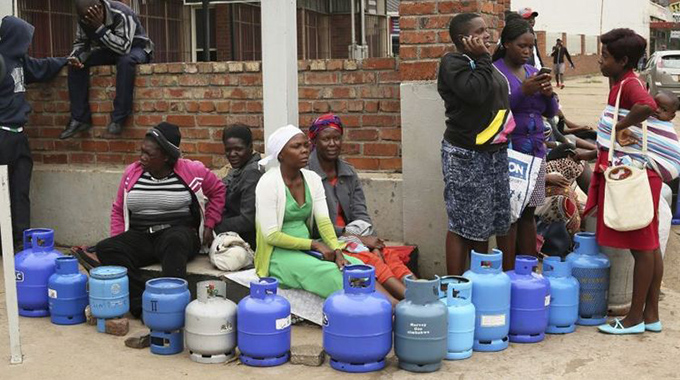Global energy policy decisions should consider Africa’s needs

Ruth Butaumocho African Agenda
Lack of adequate energy to power households and commercial activities is one of the biggest challenges that Africa continues to face daily.
The problem is even bigger in the sub-Saharan Africa region that perennially has been generating the least electricity in the world. This has resulted in acute shortages of power for both domestic and industrial use.
It is for that reason that most countries, Zimbabwe included, are now investing heavily in wind and solar plants to provide cheap and convenient power.
Encouraged by the need to increase power generation output, Zimbabwe now wants to harness methane gas deposits that are found in some parts of the country.
The country has secured potential investors for some methane gas projects to ameliorate energy challenges.
However, recent global campaigns against fossil fuels could hamper Africa’s efforts to access cheap and reliable energy for billions of people across the continent.
Early this month, the Organisation for Economic Co-operation and Development (OECD) and the International Energy Agency (IEA) said the global low oil prices as a result of Covid-19 presents a “golden opportunity” for governments to phase-out fossil fuel support and usher in an era of renewable energy sources.
Fossil fuels are made from volatile materials with low carbon-to-hydrogen ratios (like methane), to liquids (like petroleum), to non-volatile materials composed of almost pure carbon, like anthracite coal.
According to climate experts, it is believed that fossil fuels worsen greenhouse emission and increase air pollution.
However, pressurising governments to stop supporting fossil fuels certainly is an albatross on the continent’s neck and will naturally deny millions of people access to energy for their daily needs.
The majority of Africans are naturally outraged by such campaigns, which have since been labelled as a Western narrative because they do not take into account challenges faced by the continent in accessing different energy for its people.
With more than 70 percent of African people classified as low-income earners, such calls are unjust and insensitive to billions who could reap many benefits of a strategic approach to oil and gas operations in Africa.
With its rich and vast natural resources, Africa is home to an array of minerals and fossils fuels, which if explored and mined sustainably, could change the waning fortunes of most nations.
According to a paper by United Nations Economic Commission for Africa (African Climate Policy Centre), the continent boasts enormous deposits of fossil fuels accounting for about 9.5 percent; 8 percent and 4 percent of the total proven reserves of crude oil, natural gas and coal in the world, respectively.
The same source further states that the oil exports account for about 80 percent of government revenues for Libya, Nigeria and Angola, while natural gas exports account for about 60 percent of government revenues for Algeria.
The same figures suggest that despite the huge output, a good percentage of fossils fuels produced in the continent is consumed elsewhere.
Even in terms of investment, different nations have poured in millions in fossils fuel-related projects, resulting in the creation of millions of jobs, entrepreneurial opportunities and access to different forms of cheap energy.
To date, Zimbabwe is already working on two major methane gas projects that are expected to create employment for thousands of people.
Government has since secured an investor for the Cewale methane gas project in Lupane, with production expected to start next month once all the requirements have been met.
The Lupane methane gas project had been in the pipeline for years with no serious investors making any commitment despite having huge deposits.
It is estimated that the Lupane-Lubimbi area has an estimated 40 trillion cubic feet of potentially recoverable gas, probably the largest in Southern Africa.
The country is sitting on a report by the Australian Stock Exchange-listed mining house Invictus Energy on possible millions of cubic metres of gas deposits in Muzarabani.
To imagine that all these huge projects and others in the region may come to nothing if African leaders heed calls for the ban of fossils fuels, demands an urgent plan of action to ensure that dreams of access to energy are not obliterated by obscure aspirations that do not benefit the continent.
Considering that Africa has the world’s fastest growing population, it is important to note that decisions that leaders make today on banning fossils-fuel will have an impact on the future generations’ access to energy.
The challenges presented by climate change are worrisome and should be dealt with at all cost.
However, there should not be a one size-fits-all solution looking at the complexities that Africa continues to grapple with on energy provision for its majority poor.
The debate should not be around banning fossil fuels, but should centre on investing in technology that produces cleaner energy from fossils fuels.
Looking into the future, the OECD and the IEA could be proactive by encouraging huge conglomerates across the globe to invest in “clean” energy projects in Africa.
Once that happens, both continental and global aspirations would be achieved.
Millions of African families will now be able to access different forms of clean energy, a development that will in result in the reduction of emissions that harm the ozone layer.
It is undoubtedly clear that Africa remains committed to OECD and IEA’s objective to protect the ozone layer, while it also cares for the well-being of every African.










Comments